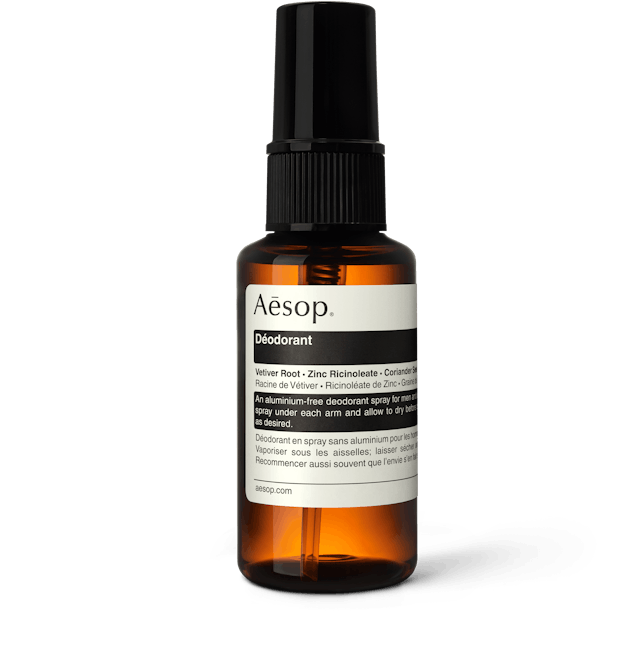Louis Cheslaw | February 28, 2024
The Retail Piggybacking Edition
On Aesop, Paul Smith, and Trojan horses.
Recommended Products

A spray deodorant by Aesop, favored by Sir Paul Smith after first experiencing the brand in the bathrooms of Japan's Park Hyatt Hotel.
Louis Cheslaw is an editor at WITI and an editorial consultant based in London.
Louis here. In Spring 2021, I had the pleasure of interviewing Sir Paul Smith. The article's premise was the ten things he couldn’t live without (a Braun travel alarm clock, Fiskars scissors, Caran D’Ache pens, etc.) and while his selections were as specific and considered as I’d hoped they’d be, learning about them wasn’t the best part of our conversation. Instead, it was the anecdotes that came as part of his reasoning.
The best was the story of how he came to wear Aesop deodorant. This didn’t make it into the final piece, but Smith told me that after first experiencing the brand in the bathrooms of Japan’s Park Hyatt Hotel, he began to notice the company when, on visits to his over 130 retail stores worldwide, he’d increasingly see that an Aesop location had opened right by his store. The more planes he got on, the more he’d encounter that sans-serif logo and warm, woodsy interior. One day, he walked in, bought some of their deodorant, and has worn it ever since.
Why is this interesting?
Not just because it reveals that Aesop’s spray deodorant is worth $35, according to Sir Paul.
Or because it shows him to be something of a mensch. After all, he and his team spent considerable time figuring out the right areas of the right cities to open locations in, and he could have easily been miffed that a newer company was seemingly piggybacking upon that research.
Instead, his response was more of the “rising tide lifts all boats” variety—sure, he’d likely be sending more customers to Aesop at the beginning, but hopefully as their regulars grew, more of them would soon wander into his locations also. Unlike Larry David’s “spite store” in the last season of Curb Your Enthusiasm (which sells coffee next to a coffee shop he hates, just to mess with them) there’s often a nice halo effect when stores that serve different functions for the same kind of person open up close to each other. If you can buy your magazines next to where you buy your underwear next to where you buy your sunglasses, all three—and you—win.
But this situation is most interesting to me because there’s also a great risk inherent in all of this. And that’s why should you start to be overly associated with another company, your brand’s story can become tied up in theirs. In a relatively short space of time, Aesop went from being in all the right hotel and restaurant bathrooms to being in one too many—selling to L’Oréal in the process for $2.5 billion. Where it once heralded the next great under-the-radar apothecary, the Aesop sign on a street today has become a signifier of gentrification. Writing about Aesop in the Financial Times last fall, Janan Ganesh said its “arrival in a district tends to round off its transition from avant-garde to Bobo.”
If I were Sir Paul, I’d worry that some of the eye-rolls Aesop now induces could rub off on people’s perception of my brand next door. While Aesop’s founder resigned in 2019, and needn’t worry quite so much about the brand’s positioning anymore, Smith remains perhaps the best-known independent designer who hasn’t yet sold to a conglomerate. It would be a shame if that part of the story was obscured by an unrequested association with his nice-smelling neighbors. (LC)
—
Thanks for reading,
Noah (NRB) & Colin (CJN) & Louis (LC)
—
Why is this interesting? is a daily email from Noah Brier & Colin Nagy (and friends!) about interesting things. If you’ve enjoyed this edition, please consider forwarding it to a friend. If you’re reading it for the first time, consider subscribing.
